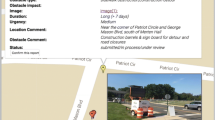Abstract
Gazetteer services are an important component in a wide variety of systems, including geographic search engines and question answering systems. Unfortunately, the footprints provided by gazetteers are often limited to a bounding box or even a centroid. Moreover, for a lot of non–political regions, detailed footprints are nonexistent since these regions tend to have gradual, rather than crisp, boundaries. In this paper we propose an automatic method to approximate the footprints of crisp, as well as imprecise, regions using statements on the web as a starting point. Due to the vague nature of some of these statements, the resulting footprints are represented as fuzzy sets.
Preview
Unable to display preview. Download preview PDF.
Similar content being viewed by others
References
Alani, H., Jones, C.B., Tudhope, D.: Voronoi-based region approximation for geographical information retrieval with gazetteers. Int. J. Geographical Information Science 15, 287–306 (2001)
Arampatzis, A., van Kreveld, M., Reinbacher, I., Jones, C.B., Vaid, S., Clough, P., Joho, H., Sanderson, M., Benkert, M., Wolff, A.: Web-based delineation of imprecise regions. In: Proc. of the Workshop on Geographic Information Retrieval, SIGIR (2004), http://www.geo.unizh.ch/~rsp/gir/
Booth, R., Richter, E.: On revising fuzzy belief bases. In: UAI International Conference on Uncertainty in Artificial Intelligence, pp. 81–88 (2003)
Hill, L.L.: Core elements of digital gazetteers: placenames, categories, and footprints. In: Borbinha, J.L., Baker, T. (eds.) ECDL 2000. LNCS, vol. 1923, pp. 280–290. Springer, Heidelberg (2000)
Jones, C.B., Purves, R., Ruas, A., Sanderson, M., Sester, M., van Kreveld, M., Weibel, R.: Spatial information retrieval and geographical ontologies: an overview of the SPIRIT project. In: Proc. of the 25th Annual International ACM SIGIR Conference on Research and Development in Information Retrieval, pp. 387–388 (2002)
Leidner, J.L., Sinclair, G., Webber, B.: Grounding spatial named entities for information extraction and question answering. In: Proc. of the Workshop on the Analysis of Geographic References, NAACL-HLT, pp. 31–38 (2003)
Markowetz, A., Brinkhoff, T., Seeger, B.: Geographic information retrieval. In: Proc. of the 3rd International Workshop on Web Dynamics (2004), http://www.dcs.bbk.ac.uk/webDyn3/webdyn3_proceedings.pdf
Purves, R., Clough, P., Joho, H.: Identifying imprecise regions for geographic information retrieval using the web. In: Proc. of the GIS Research UK 13th Annual Conference (to appear)
Vögele, T., Schlieder, C., Visser, U.: Intuitive modelling of place name regions for spatial information retrieval. In: Kuhn, W., Worboys, M.F., Timpf, S. (eds.) COSIT 2003. LNCS, vol. 2825, pp. 239–252. Springer, Heidelberg (2003)
Waldinger, R., Appelt, D.E., Fry, J., Israel, D.J., Jarvis, P., Martin, D., Riehemann, S., Stickel, M.E., Tyson, M., Hobbs, J., Dungan, J.L.: Deductive question answering from multiple resources. In: Maybury, M. (ed.) New Directions in Question Answering, pp. 253–262. AAAI Press, Menlo Park (2004)
Witte, R.: Fuzzy belief revision. In: 9th Int. Workshop on Non-Monotonic Reasoning, pp. 311–320 (2002)
Zadeh, L.A.: Fuzzy sets as the basis for a theory of possibility. Fuzzy Sets and Systems 1, 3–28 (1978)
Author information
Authors and Affiliations
Editor information
Editors and Affiliations
Rights and permissions
Copyright information
© 2005 Springer-Verlag Berlin Heidelberg
About this paper
Cite this paper
Schockaert, S., De Cock, M., Kerre, E.E. (2005). Automatic Acquisition of Fuzzy Footprints. In: Meersman, R., Tari, Z., Herrero, P. (eds) On the Move to Meaningful Internet Systems 2005: OTM 2005 Workshops. OTM 2005. Lecture Notes in Computer Science, vol 3762. Springer, Berlin, Heidelberg. https://doi.org/10.1007/11575863_130
Download citation
DOI: https://doi.org/10.1007/11575863_130
Publisher Name: Springer, Berlin, Heidelberg
Print ISBN: 978-3-540-29739-0
Online ISBN: 978-3-540-32132-3
eBook Packages: Computer ScienceComputer Science (R0)




